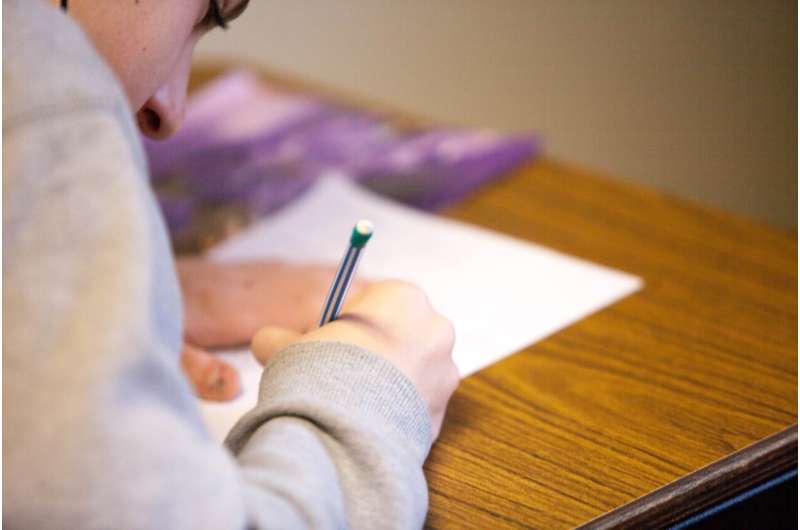Nine-year-olds in England sit timed multiplication test—but using times tables is about more than quick recall

Sadie Harley
scientific editor

Andrew Zinin
lead editor

What's seven times nine? Quick, you've got six seconds to answer.
This June, over in England in year four, aged eight and nine, will be expected to answer questions like this. They will be sitting the (MTC), a statutory assessment of their multiplication fact recall.
The MTC was introduced in 2022 with the aim of driving up standards in mathematics. It's an online test that children take on a tablet or computer, made up of 25 questions with six seconds per question.
Being able to quickly recall multiplication facts is valuable. Not having to think about seven times nine, just knowing that it's 63, frees up a child's mental thinking space. This means they can focus on different aspects of the mathematics they are doing, such as completing multi-step problems or using reasoning to solve context-based problems.
Being able to quickly recall multiplication facts is also the foundation for more advanced mathematics topics that children will encounter at secondary school.
shows that the MTC is an accurate reflection of children's multiplication fact recall. But the learning they do for this test doesn't necessarily help them apply this knowledge in other areas of mathematics. What's more, focus on the MTC may be diverting teaching time away from other math knowledge.
Since the multiplication tables check was introduced in 2022, the in the test has increased year-on-year from 19.8 in 2022 to 20.6 in 2024. This suggests that schools are placing more emphasis on children's multiplication fact recall—and on preparing them for this test.
the NAHT (National Association of Head Teachers) has suggested that the test is unnecessary, and that it places too much emphasis on fact recall at a cost to other areas of mathematics. The union has also that it disadvantages some children for reasons such as digital accessibility.
has investigated whether the MTC is a good way of testing children's recall of multiplication facts. We have found that children perform just as well on a more traditional paper-and-pencil timed fact test as on a computer test equivalent to the MTC. However, having a time limit per question—which is only possible with a computerized test—is essential to assess recall, rather than fast calculation.
There was no evidence that any children were particularly disadvantaged by the computerized test. However, we did find that children's attention skills and how quickly they could enter numbers into the tablet they were using did influence their scores.
This suggests that, for it to be a fair test, it is important that children are familiar with the technology they are using to complete the test. Given that there are stark differences in access to , this may pose an issue for some children.
The purpose of introducing the MTC was to improve children's broader mathematics attainment by improving their multiplication fact recall. But performance in the year six Sats tests, which assess a range of mathematical skills, .
Crucially, improving children's multiplication fact recall through retrieval practice doesn't equate to improving their ability to use the multiplication facts they know. If posed a question such as "Tara has seven books. Ravi has four times as many. How many books do they have altogether?" Children who can recall that 5 x 7 = 35 may still not be able to solve the problem.
Time pressure
What's more, because the MTC is a timed test, teachers and parents may use to prepare children and help them improve their multiplication fact . But our research showed that while practice with a computerized game can support children's fact recall, the benefits to learning are the same, whether or not children are encouraged to answer as quickly as possible.
not yet published in a peer-reviewed journal, we found that children who were anxious about mathematics learnt less when practicing with time pressure compared to children without mathematics anxiety.
Without time pressure, anxiety levels were not related to the amount of learning. Doing some regular multiplication fact retrieval practice is more important than the type of , for all learners.
Even though the MTC is a timed assessment, it doesn't mean that children only need to do timed practice to prepare for this. Some children may benefit more from less time pressure when practicing.
Multiplication fact recall is just one and so having a good balance is important. Fact recall and testing should go hand in hand with other areas of mathematics learning, such as understanding concepts, choosing strategies and solving applied .
Recalling multiplication facts doesn't automatically help children to apply their knowledge. So, although working towards the multiplication tables check can support fact recall, children will need extra support in knowing how to use and apply these facts.
Provided by The Conversation
This article is republished from under a Creative Commons license. Read the .![]()





















